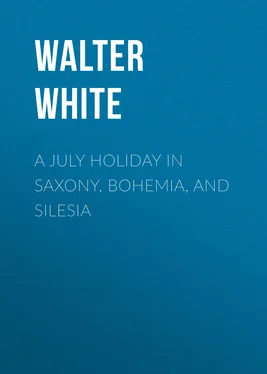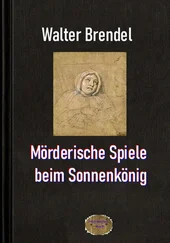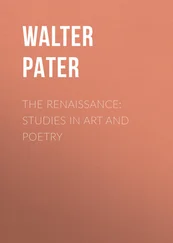Walter White - A July Holiday in Saxony, Bohemia, and Silesia
Здесь есть возможность читать онлайн «Walter White - A July Holiday in Saxony, Bohemia, and Silesia» — ознакомительный отрывок электронной книги совершенно бесплатно, а после прочтения отрывка купить полную версию. В некоторых случаях можно слушать аудио, скачать через торрент в формате fb2 и присутствует краткое содержание. Жанр: Путешествия и география, foreign_antique, на английском языке. Описание произведения, (предисловие) а так же отзывы посетителей доступны на портале библиотеки ЛибКат.
- Название:A July Holiday in Saxony, Bohemia, and Silesia
- Автор:
- Жанр:
- Год:неизвестен
- ISBN:нет данных
- Рейтинг книги:5 / 5. Голосов: 1
-
Избранное:Добавить в избранное
- Отзывы:
-
Ваша оценка:
- 100
- 1
- 2
- 3
- 4
- 5
A July Holiday in Saxony, Bohemia, and Silesia: краткое содержание, описание и аннотация
Предлагаем к чтению аннотацию, описание, краткое содержание или предисловие (зависит от того, что написал сам автор книги «A July Holiday in Saxony, Bohemia, and Silesia»). Если вы не нашли необходимую информацию о книге — напишите в комментариях, мы постараемся отыскать её.
A July Holiday in Saxony, Bohemia, and Silesia — читать онлайн ознакомительный отрывок
Ниже представлен текст книги, разбитый по страницам. Система сохранения места последней прочитанной страницы, позволяет с удобством читать онлайн бесплатно книгу «A July Holiday in Saxony, Bohemia, and Silesia», без необходимости каждый раз заново искать на чём Вы остановились. Поставьте закладку, и сможете в любой момент перейти на страницу, на которой закончили чтение.
Интервал:
Закладка:
The alarm-bell began to ring. Mosen and the others galloped off with their prize, and Kunz, mounting his horse with young Albert before him, and attended by Schweinitz, lost no time in making for the frontier. If Isenburg could be reached before the pursuers came up, the game would be in his own hands. On they went in the dim night through the Rabensteiner Forest, along rugged and darksome ways, where they wandered from the track, their horses stumbled or floundered in miry holes, forced to choose the wildest and least-frequented routes, for dogs were barking and alarm-bells ringing in all the villages, warning honest folk that knaves were abroad. The dewy morning dawned, birds twittered among the branches, the sun arose, daylight streamed into the forests, and still the fugitives urged their panting horses onwards. A few hours later the young prince, worn out by want of rest and the increasing heat, complained of thirst; whereupon Kunz, though still a half-score miles from the Bohemian frontier, halted not far from the village of Elterlein, and crept about in the wood to pluck berries for the boy's refreshment. While the captain was thus occupied, a certain charcoal-burner—George Schmidt by name—at work near the spot, attracted by the glint of armour between the trees, approached the halting-place, made suspicious, perhaps, by the alarm-bells. To his surprise, he saw horses showing marks of hasty travel, and a fair-haired boy well attired, who said at once, "I am the young prince. They have stolen me." No sooner spoken than the Köhler , running up to Kunz, who was still stooping over the berries, felled him with a blow of the stout pole which he used in tending his fires. A shout brought up a gang of his comrades, sturdy fellows with long hair and grimy faces, who promptly laid hold of Kunz and Schweinitz, bound their hands, and carried them off for safe keeping to the neighbouring monastery of Grünhain. Thither also was the young Albert borne in friendly arms, and from thence, on the following day, an escort, among whom went the Köhler , conducted him back to his weeping mother—a real triumphal procession by the time they arrived at Altenburg.
Mosen and his troop, meanwhile, had betaken themselves to a hiding-place not far from the castle of Stein, on the right bank of the Mulde, about half way towards the frontier. While some made good their retreat to secret quarters, the principals concealed themselves with Prince Ernest in a rocky cave screened by trees, waiting for a favourable opportunity to renew their flight. But hearing, while on their look-out, sundry passers-by talk of the capture of unlucky Kunz, they sent a messenger to Friedrich von Schonburg at Hartenstein, offering to deliver up the prince on condition that they should be left free to depart unmolested. The condition was granted: they gave up their captive, and were seen no more in all the province; and Schonburg conveyed Ernest to Chemnitz, where he was received by his father the Elector.
Unlucky Kunz having been carefully escorted to Freiberg, was there beheaded on the 14th of July—an example to knightly kidnappers. On the next day the Köhler's homely gaberdine and the garments of the princes were hung up in the church at Ebersdorf, not far from the scene of the rescue. As for the Köhler himself, he had but to speak his wishes, for the Electress, in the joy of her heart at the restoration of her sons, could not sufficiently reward the man who had saved the younger. "I worried them right well"—( wohl getrillt )—he said, when recounting how he had laid about him with his pole at the time of the rescue; and ever afterwards was he known as the Triller . His wishes were modest enough;—a little bit of land, and liberty to hunt and cut wood in the forest—and amply were they gratified.
Such is in brief the story of the Prinzenraub , as it happened four hundred years ago—a memorable event in Saxon history. A walled-up window in the castle at Altenburg, on the side towards the Pauritzer Pond, is said to indicate the place where in the former building the robbers entered. The Princes' Oaks still flourish; and the cave in which Ernest was hidden is still known as the Prinzenhöhle . And our own history is involved in the event, for from that same Ernest descends the Consort of our Queen.
To most English readers the Prinzenraub was an unknown story until a few years ago, when Thomas Carlyle published it from his vigorous pen in the Westminster Review , where all the circumstances are brought before us in the very vividness of life. "Were I touring in those parts, I would go and see," says the author, referring to the rumour that the estate bestowed on the Triller remained still in possession of his posterity. By inquiry at Altenburg, I learned that this estate lay in the neighbourhood of Zwickau, so, as I also was bound for the Bohemian frontier, I did go and see on the way.
CHAPTER IV
Zwickau—Beer Bridge—Beer Mount—The Triller Estate—Triller Bierbrauerei—The Braumeister—The Beer—Four Hundredth Anniversary of the Prinzenraub—A Friendly Clerk—"You will have a Tsigger?"—Historical Portraits—A Good Name for a Brewery—A Case of Disinterestedness—Up the Church Tower—The Prospect—Princess Schwanhildis—The Fire-god Zwicz—Luther's Table—The Church—Geysers—Petrified Beds—Historical Houses—Walk to Oberhaselau—The Card-players—The Wagoners.
The dark roofs of a few dull streets, a lofty old church tower, the tall chimneys, and clouds of steam and smoke of a busy suburb, rising amid orchards, gardens, and hop-grounds in the pleasant and thickly-wooded valley of the Mulde, are the features presented by Zwickau as you approach it from the terminus. There needs no long research to discover that the Prinzenraub is a household word among the people: hanging on the wall in the hotel you may see engravings of the Prinzenhöhle , the castle of Stein, the monastery at Grünhain, and other places incidental to the robbery; and the waiters are ready to tell you that the Triller estate lies near Eckersbach, about half an hour's walk to the east of the town.
On my way thither I crossed the Mulde, a lively stream, flowing between steep slopes of trees, broken here and there by a red fern-fringed cliff. A Saxon liking—one which the Anglo-Saxon has not forgotten—is betrayed in the name of the bridge—Beer Bridge; it leads to Beer Mount, which conceals within its cool and dark interior countless barrels of the national beverage. While walking up the hollow road that winds round the hill, you see on one side the entrances to the deeply excavated cellars, on the other a tavern, overshadowed by linden-trees, offering refreshing temptations to the thirsty visitor.
The road presently rising across open fields brings you in sight of a pile of huge bright-red brick buildings, erected on the farther side of a deep, narrow dell, contrasting well with the green of a cherry orchard and woods in the rear. There lies the Triller estate. Times are changed; and where the sinewy Köhler tilled his field and reared his family, now stands a brewery— Triller Bierbrauerei . The wakeful genius of trade has taken possession, and finds in the patriotic sentiment inspired by the history of the place a handsome source of profit.
I addressed myself to the Braumeister — Brewmaster —who on hearing that one of England's foremost authors had published the story of the Prinzenraub , manifested a praiseworthy readiness to satisfy my curiosity. The estate had long been out of the hands of the Triller family, so long that he could not remember the time—perhaps fifty years. But the Trillers were not extinct: one was living at Freiberg, and two others elsewhere in Saxony. The place now belongs to a company, under whose management Triller beer has become famous in all the country round; and not undeservedly, as I from experience am prepared to affirm. There is a large garden, with paths winding among the trees, and open places bestrewn with tables and chairs enough for the innumerable guests who quench their thirst at the brewery.
Читать дальшеИнтервал:
Закладка:
Похожие книги на «A July Holiday in Saxony, Bohemia, and Silesia»
Представляем Вашему вниманию похожие книги на «A July Holiday in Saxony, Bohemia, and Silesia» списком для выбора. Мы отобрали схожую по названию и смыслу литературу в надежде предоставить читателям больше вариантов отыскать новые, интересные, ещё непрочитанные произведения.
Обсуждение, отзывы о книге «A July Holiday in Saxony, Bohemia, and Silesia» и просто собственные мнения читателей. Оставьте ваши комментарии, напишите, что Вы думаете о произведении, его смысле или главных героях. Укажите что конкретно понравилось, а что нет, и почему Вы так считаете.












